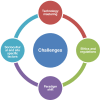Opportunities and challenges for decentralised clinical trials in sub-Saharan Africa: a qualitative study
- PMID: 37739467
- PMCID: PMC10533674
- DOI: 10.1136/bmjopen-2023-075903
Opportunities and challenges for decentralised clinical trials in sub-Saharan Africa: a qualitative study
Abstract
Introduction: Digital health has gained traction in research and development, and clinical decision support systems. The COVID-19 pandemic accelerated the adoption of decentralised clinical trials (DCTs) as a mitigation and efficiency improvement strategy. We assessed the opportunities and challenges of a digital transformation in clinical research in sub-Saharan Africa from different stakeholders' perspectives.
Methods: A qualitative study, including 40 in-depth semi structured interviews, was conducted with investigators of three leading research institutions in sub-Saharan Africa and Switzerland, contract research organisations and sponsors managing clinical trials in sub-Saharan Africa. A thematic approach was used for the analysis.
Results: Interviewees perceived DCTs as an opportunity for trial efficiency improvement, quality improvement and reducing the burden of people participating in clinical trials. However, to gain and maintain an optimal quality of clinical trials, a transition period is necessary to tackle contextual challenges before DCTs are being implemented. The main challenges are categorised into four themes: (1) usability and practicability of the technology; (2) paradigm shift and trial data quality; (3) ethical and regulatory hurdles and (4) contextual factors (site-specific research environment and sociocultural aspects).
Conclusion: The transformation from a site to a patient-centric model with an increased responsibility of participants should be context adapted. The transformation requires substantial investment, training of the various stakeholders and an efficient communication. Additionally, commitment of sponsors, investigators, ethics and regulatory authorities and the buy-in of the communities are essential for this change.
Keywords: Clinical Trial; PUBLIC HEALTH; QUALITATIVE RESEARCH.
© Author(s) (or their employer(s)) 2023. Re-use permitted under CC BY. Published by BMJ.
Conflict of interest statement
Competing interests: None declared.
Figures
References
Publication types
MeSH terms
LinkOut - more resources
Full Text Sources
Medical

